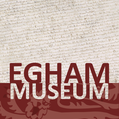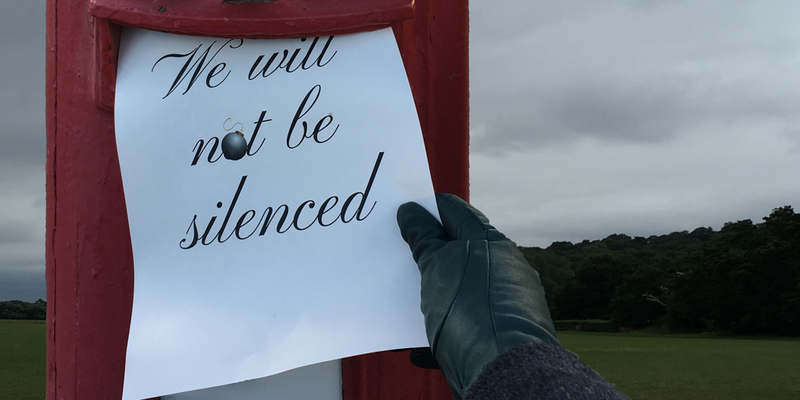Suffrage Commissions
Egham Museum’s 2018 ‘Suffrage in Egham’ project worked in partnership with Royal Holloway, University of London to commission artistic interpretations that explored women’s stories.
Textile Artwork
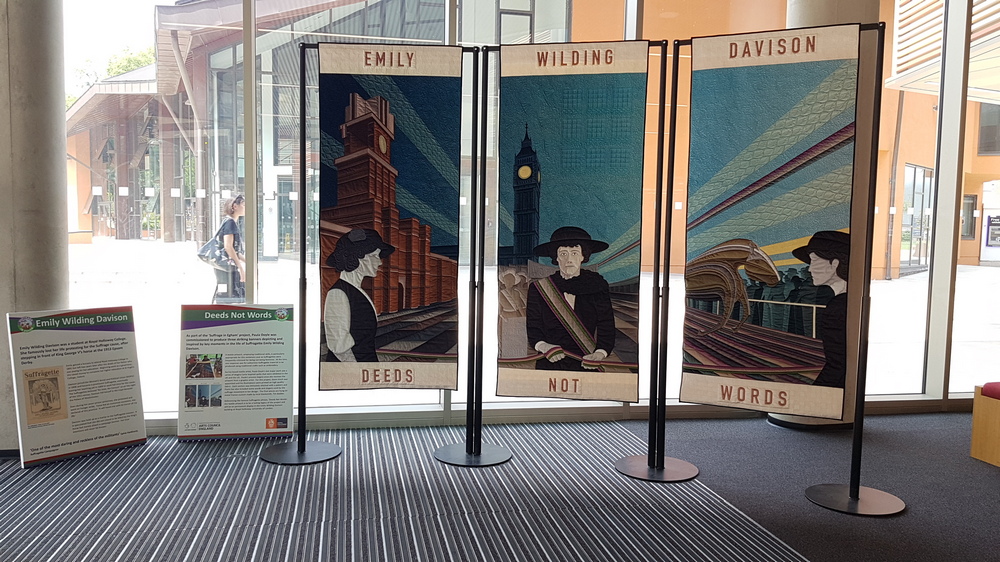
As part of the ‘Suffrage in Egham’ project, Paula Doyle was commissioned to produce three striking banners depicting and inspired by key moments in the life of Suffragette Emily Wilding Davison.
Emily Wilding Davison was a student at Royal Holloway College. She famously lost her life protesting for the Suffrage cause, after stepping in front of King George V’s horse at the 1913 Epsom Derby.
Emily gained a bursary to attend Royal Holloway College in 1891 but left two years later after the death of her father who was paying for her education. Beginning work as a governess, she saved money to complete her higher education at St Hugh’s College, Oxford.
Davison joined the Women’s Social and Political Union (WSPU) in 1906 and became a prominent Suffragette, eventually leaving her teaching job in 1909 to work full-time for the cause. The Suffragettes believed ‘No Vote, No Census!’ so on the night of the 1911 census, Davison hid herself in the crypt beneath the Palace of Westminster.
Even during her seven prison sentences, she protested and went on hunger strike. Force fed on numerous occasions, she declared of this practice: ‘It will haunt me with its horror all my life.’
Davison was held up as a martyr to the Suffragette mission. It is speculated that she did not intend to be killed by the King’s horse but merely attach a campaign banner. Her true intentions will never be known.
‘One of the most daring and reckless of the militants’
Sylvia Pankhurst, Suffragette Campaigner
A textile artwork, employing traditional skills, is particularly appropriate for this centenary year as Suffragettes were frequently criticised for being not being feminine. At the time, one response was for subversive Suffragette material to be produced using traditional crafts such as embroidery.
Surrey based textile artist, Paula Doyle’s last major work was a series of Magna Carta inspired quilts that were exhibited in the UK and the US. Paula’s process begins once she receives the artwork from a graphic artist. For this project, Gavin Kinch was appointed and his illustrations were printed on high quality fabric. Each section was intricately stitched with a pattern and Paula has also included some words and slogans used by the suffrage movement in her design. The final pieces are hung on metal frames custom made by local blacksmith, Tim Badder.
Referencing the famous Suffragette phrase, ‘Deeds Not Words’, the textile artwork is to be a lasting legacy of the project and will be on permanent display in the Emily Wilding Davison building at Royal Holloway, University of London.
Play in the Community
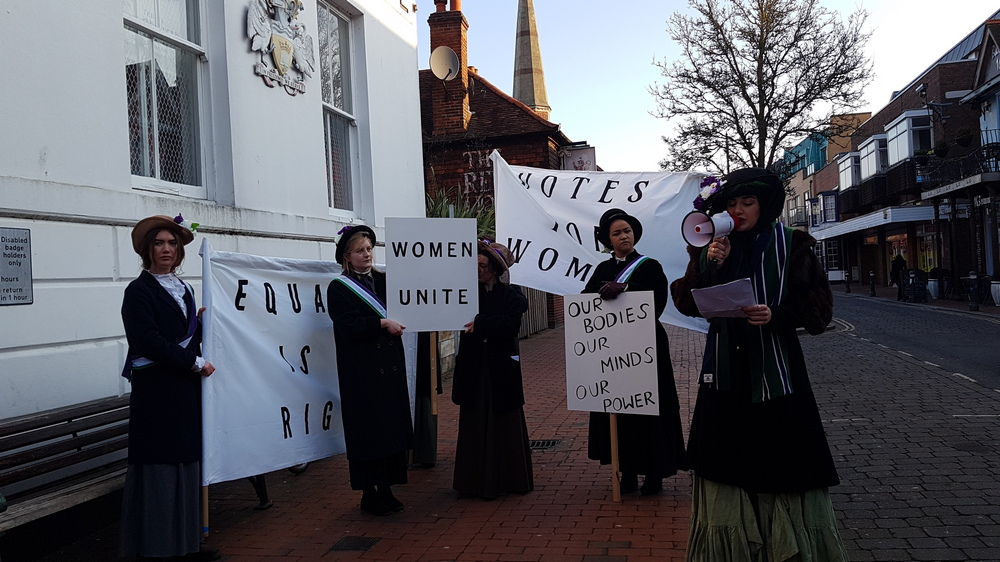
To mark the centenary year, Royal Holloway’s ‘Play Festival’ comprising staff and students from the Music, Drama, English and Media Arts departments, created a suffrage inspired programme of performances.
Using the theme ‘The Arts of Democracy’, individual Play Festival pieces were performed across Holloway Campus between 29-31 May 2018. The Festival included music recitals, creative writing workshops, literary and art history talks, discussions and traditional drama performances. A selection of these were also performed in Egham town centre during the week leading up to Magna Carta Day 2018.
On 6 February 2018, the anniversary of the Representation of the People Act, the ‘Staging Suffrage’ team of drama students led by Rebecca McCutcheon, David Bullen and Nicola Hewitt-George, recreated excerpts from suffrage speeches and songs while marching through local locations.
A further performance was Ashley Thorpe’s Japanese Nô theatre play, titled ‘Emily’. This specially written piece explored the legacy of Emily Wilding Davison’s death at the Epsom Derby in 1913. Emily herself had an interest in Japan, and after visiting the 1910 Japan-British exhibition in London, she seemed to be inspired by the exhibition’s intimation that women could actively participate in Japanese society as recognized citizens of the state.
Music Composition
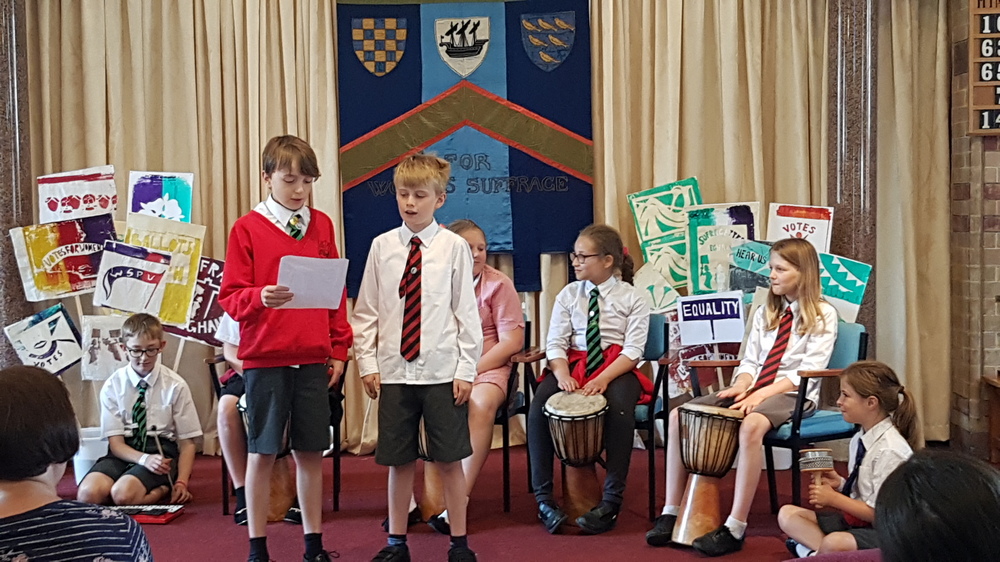
As part of the ‘Suffrage in Egham’ project, Samantha Fernando was commissioned to compose a new musical piece inspired by the struggle for the vote. Titled ‘The Echo of a Woman’, the work is performed by a solo soprano and Chamber Orchestra.
Lecturer in Composition at Royal Holloway, University of London, Samantha was awarded a Royal Philharmonic Society Composition Prize in 2013. Since then, she has received commissions from numerous ensembles and festivals and performed in venues across Europe.
Samantha’s piece was composed in response to textual fragments on the theme of women’s rights. These texts are ‘The Lost Joy’ by Olive Schreiner, ‘Locked Inside’ by Charlotte Perkins Gilman and ‘The Echo of a Woman’ by JL Williams.
As well as this, staff from Royal Holloway’s Music Department worked with pupils at Egham Hythe Primary School and three other schools in the Autumn of 2018. The pupils’ works are responses to the three texts on which Samantha’s piece is based. Using these as a starting point, they have devised their own performances. They have also had the opportunity to learn about Dame Ethel Smyth and her contribution to the women’s suffrage movement as well as hearing from Samantha and talking to her about her work as a composer in 2018.
